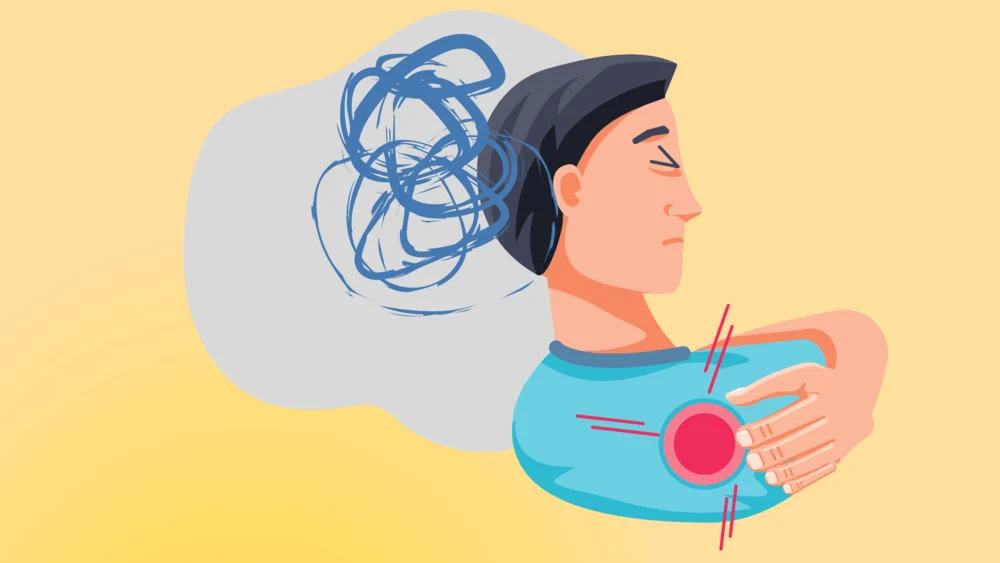The Link Between Chronic Pain and Mental Health
How Physiotherapy Can Help You Heal Both Body and Mind
Chronic pain is more than just an ongoing physical discomfort, it’s a condition that deeply affects your emotional and mental well-being. Whether the pain is caused by an injury, a medical condition, or has no identifiable source, it often leads to frustration, anxiety, and even depression. Many people experiencing chronic pain find themselves trapped in a cycle where their physical pain worsens their mental health, and their mental health, in turn, heightens the perception of pain.
In this blog, we explore the powerful link between chronic pain and mental health and how physiotherapy can play a key role in managing both.

What is Chronic Pain?
Chronic pain is defined as persistent pain that lasts for 12 weeks or longer, even after the initial cause has healed. It can affect different parts of the body and range from mild discomfort to severe, life-altering pain.
Common causes of chronic pain include:
- Arthritis
- Fibromyalgia
- Chronic back pain
- Migraines or tension headaches
- Nerve damage
- Cancer-related pain
While the root may be physical, chronic pain often becomes a condition of its own, impacting all areas of life.

How Chronic Pain Affects Mental Health
Chronic pain doesn’t only affects the body, it reshapes your mental state, too. Many individuals suffering from long-term pain develop emotional and cognitive issues that significantly reduce their quality of life.
1. Depression and Chronic Pain
Living in constant pain can make people feel hopeless, frustrated, and emotionally exhausted. It disrupts daily activities, social connections, and sleep, leading to isolation and depression.
Common symptoms include:
- Persistent sadness or hopelessness
- Loss of interest in favorite activities
- Trouble concentrating
- Low energy and fatigue
- Sleep disturbances
2. Anxiety and Chronic Pain
Chronic pain often brings a fear of the future: “Will this get worse?” or “Can I handle this again tomorrow?” Anxiety arises from this uncertainty.
Typical symptoms include:
- Nervousness or unease
- Muscle tightness
- Racing thoughts
- Panic attacks
- Difficulty relaxing
3. Stress and Chronic Pain
Managing chronic pain is mentally exhausting. The physical toll combined with emotional pressure results in chronic stress.
Symptoms of stress may include:
- Irritability or mood swings
- Headaches and muscle tension
- Lack of concentration
- Insomnia
4. Cognitive Impairment (“Brain Fog”)
Chronic pain can drain your mental energy, leading to confusion, forgetfulness, and trouble focusing, commonly referred to as “brain fog.” It’s often worsened by stress and poor sleep.
The Vicious Cycle: How Mental Health Affects Chronic Pain
The relationship between pain and mental health is cyclical.
- Depression amplifies the perception of pain.
- Anxiety increases muscle tension, worsening pain.
- Stress promotes inflammation and pain sensitivity.
This creates a frustrating loop, pain worsens mental health, and poor mental health makes pain harder to manage.

How Physiotherapy Can Help Break the Cycle
Physiotherapy isn’t just about physical recovery, it also supports your emotional and psychological well-being. Here’s how:
1. Pain Management Techniques
- Manual Therapy: Hands-on techniques to reduce pain and stiffness
- TENS Therapy: Electrical stimulation to block pain signals
- Heat & Cold Therapy: Reduces inflammation and discomfort
- Exercise Therapy: Builds strength and flexibility to reduce chronic pain
2. Mental Wellness Support
- Breathing & Relaxation Techniques: Reduce anxiety and stress
- Mindfulness Practices: Help patients stay grounded
- Structured Exercise: Boosts endorphins, improves mood and energy levels
- Better Sleep: Reduced pain leads to improved sleep, easing anxiety and irritability
3. Building Resilience
Physiotherapy empowers you to take control of your body again. Overcoming physical limitations improves self-confidence, helping you feel mentally stronger and emotionally stable.

FAQs About Chronic Pain and Mental Health
Q1: Can chronic pain lead to mental health disorders?
Yes, it often leads to depression, anxiety, and stress due to its constant interference with daily life.
Q2: Can physiotherapy help with both pain and emotional well-being?
Absolutely. Physiotherapy not only reduces physical pain but also improves mental health through movement, exercise, and relaxation techniques.
Q3: How soon can I expect results?
Some patients feel relief after a few sessions, but long-term benefits usually require consistent care over several weeks.
Q4: Do I need medication along with physiotherapy?
It depends on the case. Many patients benefit from a combined approach. Consult your doctor and physiotherapist for a tailored treatment plan.

Start Your Healing Journey with FitoFine Physiotherapy
At FitoFine Physiotherapy, we understand the complex relationship between chronic pain and mental health. Our experts use proven, personalized techniques to treat both body and mind, ensuring holistic healing.
Whether you’re recovering from injury, battling fibromyalgia, or feeling emotionally exhausted from pain, we’re here to help.
Contact Us Today!
FitoFine Physiotherapy Clinic
Hours: Mon–Sat: 5:00 PM – 10:00 PM | Sunday: Closed
Email: fitofine.in@gmail.com
Website: www.fitofine.com
Phone/WhatsApp: +91 6295115701
FitoFine: Helping You Live Pain-Free and Mentally Strong!


